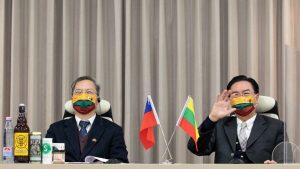In December 2021, Nicaragua switched official recognition from the Republic of China (ROC, or Taiwan) to the People’s Republic of China (PRC), reigniting discussion about the diplomatic isolation of the self-governing island. Since the election of President Tsai Ing-wen of the independence-leaning Democratic Progressive Party in 2016, Taiwan’s list of international allies has dwindled from 22 to just 14. At the Macro Situation Annual Forum hosted by Renmin University in Beijing last month, PRC Vice Foreign Minister Le Yucheng said that it was only “a matter of time” before Taiwan lost all of its diplomatic allies, adding that the Central American country’s move to cut ties with Taipei represented “the general trend” and was a sign of “international justice.”
Curiously, the decision of the Nicaraguan government came at a time when Taiwan appears to be gaining momentum in another part of the world, one that has long been dominated the PRC: Eastern Europe.
What started off as a low-key sister city agreement between Prague and Taipei in January 2020 sparked a domino effect that very few observers could have predicted. While the relatively symbolic partnership between the two capital cities may have been more reflective of the personal convictions of Prague Mayor Zdenek Hrib, Taiwan’s political engagements in the region since have taken on a far greater strategic importance. Largely due to China’s disproportionate reactions, the announcement by Lithuania in July 2021 that it would host the ROC representative office using the name Taiwan rather than “Taipei” received worldwide media attention.
The official inauguration of a de facto embassy in Vilnius – the first of its kind in Europe – was by no means the only diplomatic gain scored by Taiwan in 2021. In October, ROC Foreign Minister Joseph Wu led an unprecedented 65-member delegation of government officials and businesspeople to Czechia and Slovakia. The objective of the visit was twofold: to thank those nations for their donations of COVID-19 vaccines and to cultivate deeper cooperation with like-minded partners who share the values of freedom, democracy, and respect for human rights.
In December, Slovakia returned the favor by allowing a group of officials, researchers, and industry representatives to travel to Taiwan on a government plane to attend the first session of the Taiwanese-Slovak Commission on Economic Cooperation. Taiwan and Slovenia’s plans to open trade offices in each other’s territories represented the latest sign of the newfound love between Taiwan and the countries of Central and Eastern Europe.
But how to explain this diplomatic bonanza – one that would have been deemed impossible in the pre-pandemic era?
The pandemic has undoubtedly intensified the world’s vague sense of disillusionment concerning China, causing local governments to reconsider their relations with Beijing. China was received with open arms in Central and Eastern Europe (CEE) in 2012, when Beijing put forth its 16+1 mechanism (now dubbed the 17+1, after the addition of Greece) to expand its influence in Europe. However, initial enthusiasm gradually morphed into perplexity in light of vague objectives and unfilled promises. Of the approximately $126 billion of Chinese investments in the European Union between 2000 and 2019, less than $10 billion was directed at CEE countries. According to the American Chamber of Commerce in Taiwan, Chinese investments in CEE make up less than 1 percent of overall regional foreign direct investment.
It is in this context that Taiwan is trying to increase its influence in the region by looking out for new economic opportunities. In the past few months, Taiwan has signed a series of MOUs with Czechia covering cybersecurity, the space industry, green energy, and smart machinery, as well as with Slovakia over electric vehicles, the digitization of small and medium-sized enterprises, and smart cities. Lithuania, for its part, has agreed to work with Taiwan in the areas of semiconductors, life sciences, laser and satellite technology, crystal research, and finance. Taipei also announced the launch of a $1 billion credit program to fund joint projects between Lithuanian and Taiwanese companies.
Taipei intends to take full advantage of the vacuum left by Beijing, but it remains to be seen whether the island’s engagement in Eastern Europe will bring tangible results or end up a disappointment, like the results of those countries’ experiments with China. While governments in the region are voicing support for Taiwan, they have already said that they plan to uphold their own “one China” policies, which means not diplomatically recognizing Taipei. The challenge for Taiwan in the coming months will be to capitalize on this positive dynamic to thrive internationally without the benefits and protections associated with state sovereignty. It is certainly in the island’s best interests to broaden and deepen its ties with democratic European partners to secure its position within the international community rather than to remain at the mercy of official allies, many of whom have proven unreliable.

































